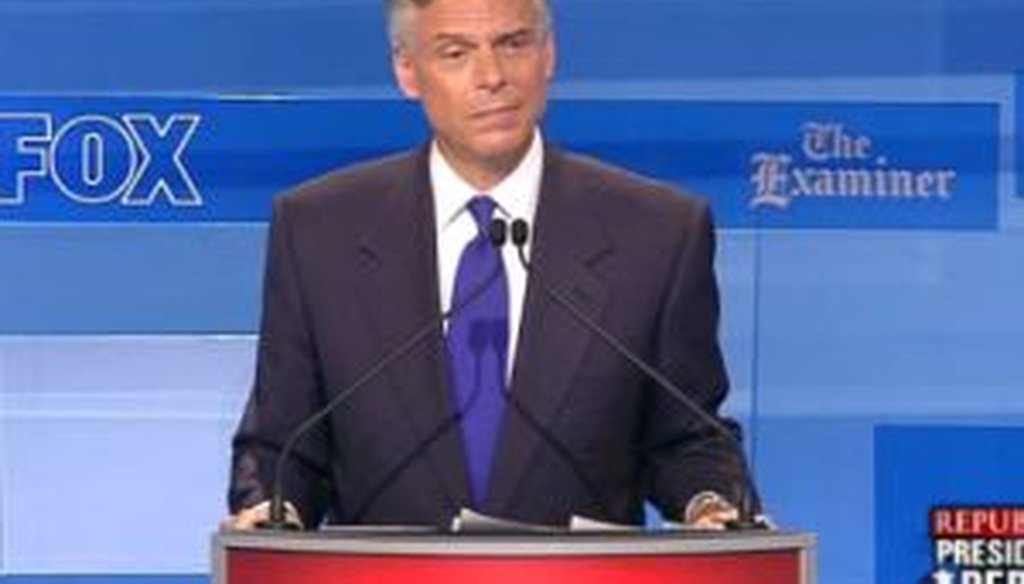Stand up for the facts!
Our only agenda is to publish the truth so you can be an informed participant in democracy.
We need your help.
I would like to contribute

Former Utah Gov. Jon Huntsman was one of eight candidates to take part in a debate in Ames, Iowa, on Aug. 11, 2011.
Jon Huntsman says he enacted a flat tax as Utah governor
During the Republican presidential debate in Ames, Iowa, on Aug. 11, 2011, former Utah Gov. Jon Huntsman touted his record on taxes. When he was governor, he said, Utah had "historic tax cuts. We created a flat tax in the state of Utah, exactly what needs to happen in this country."
This isn’t the first time Huntsman has made that claim. Our PolitiFact team in New Hampshire checked a similar comment Huntsman made at a July 4th, 2011, house party in Belmont, N.H. At that July 4 event, Huntsman said that when he was governor, he worked with the state Legislature to create a flat tax that "cut income taxes by 30 percent."
Since Huntsman didn’t repeat the claim that this tax changes had "cut income taxes by 30 percent," we will only rate him now on the question of whether his administration "created a flat tax in the state of Utah."
When we first reported this item, the Huntsman campaign pointed us to published reports from this spring and from 2007 that explained how Huntsman began pushing for the changes soon after he took office in January 2005.
"We need a tax policy that is not only friendly to our citizens, but also creates a competitive environment for business. Business as usual will leave us behind our neighboring states," Huntsman said during his first State of the State speech in January 2005.
Huntsman and the Legislature achieved their goal with two changes in tax law over two years.
When Huntsman took office, there were six income tax brackets ranging from 2.3 percent to 7 percent. Ultimately, Huntsman and the Legislature approved a single rate of 5 percent.
This created a much flatter tax, stripping away most of the deductions and credits. Utah taxpayers still adjust their income in ways such as counting interest earned on bond income or deducting from income the withdrawals they make from medical savings accounts.
The research arm of the Utah Legislature says this was not a flat tax in the purest sense. "Although the new system has a single statutory rate of 5.0 percent, it is not a proportional or 'flat' income tax system. Rather, Utah’s new income tax system remains progressive through tax credits,'' said a January 2010 report of the Utah Office of Legislative Research and General Counsel. (A progressive tax system is one in which richer people pay a higher percentage of their income in taxes than poorer people do.)
Roughly 90 percent of taxpayers get to claim as a credit from state taxes some of what they claim as deductions and tax exemptions under the federal tax code. The credit phases out and goes away from those making very high incomes in the state.
This makes the effective tax rate about 3 percent for Utah taxpayers earning $70,000 a year in 2008 and 4 percent for a household with $100,000 in taxable income, according to the legislative group's analysis.
"There's no question this is a single rate tax -- but with the credit, the overwhelming majority of taxpayers do not pay 5 percent of their income,'' said Phil Dean, the policy analyst who authored the 2010 study.
Anti-tax groups have given Huntsman high marks for the overhaul and have said they consider it to be a flat tax.
The libertarian Cato Institute gave Huntsman the highest score of any governor on tax policy in 2006. Likewise, the Club for Growth praised Huntsman's tax reform while adding there were some "minor blemishes"' that included other tax increases during his tenure. (It's worth noting that both groups fault Huntsman for increases in state spending that occurred under his watch.)
While we gave Huntsman a Mostly False for his previous statement, most of our downgrade stemmed from our criticism of his claim that his policies "cut income taxes by 30 percent." The system he and the Legislature enacted in Utah wasn’t a pure flat tax, since taxpayers may still make adjustments for certain financial factors. But it is a flatter tax, and it includes one major defining factor of a flat tax -- a single rate for all income groups. On balance, we rate his claim Mostly True.
Our Sources
Fox News, Republican candidates debate, Aug. 11, 2011, accessed via CQ Transcriptswire (subscribers only)
PolitiFact, "Jon Huntsman touts record enacting 'flat tax,' but how accurate is claim?" July 28, 2011
Utah Office of Legislative Research and General Counsel, "What happened to taxpayers under Utah's individual income tax?" presentation, Jan 26, 2010
Center for Public Policy and Administration at the University of Utah, analysis of tax law, April 25, 2007
Utahlegislative analysis of tax reform, March 2007
Tax Foundation, blog post, Sept. 22, 2006
Tax Foundation, "The Facts on Utah's Tax Climate"
Club for Growth, 2012 Presidential White Paper on Gov. Jon Huntsman, accessed July 14, 2011
All American Patriots, Text of Gov. Jon Huntsman's 2005 State of the State Address, Jan. 22, 2005
Browse the Truth-O-Meter
More by Louis Jacobson
Jon Huntsman says he enacted a flat tax as Utah governor
Support independent fact-checking.
Become a member!
In a world of wild talk and fake news, help us stand up for the facts.












































